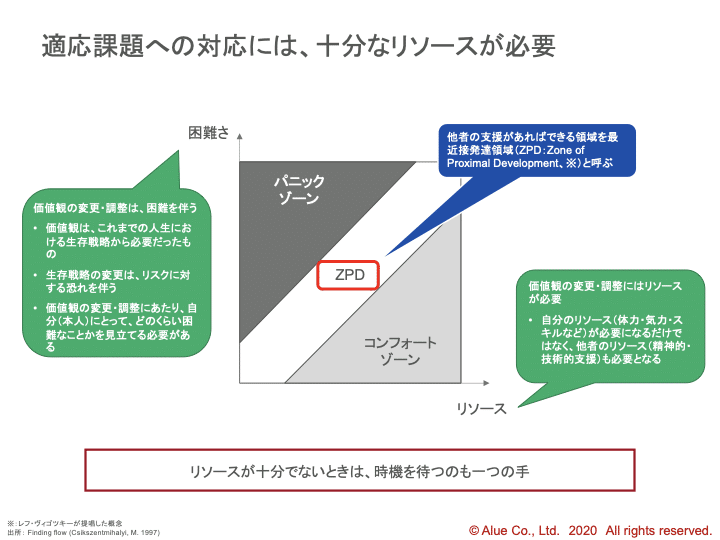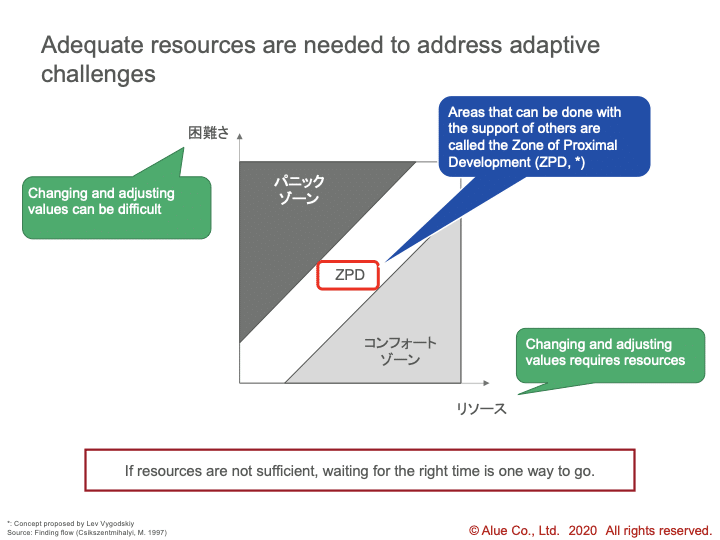
上司が部下の「よき同行者」であるために
前回の記事では、主体的真理を起点とする人材育成を目指す場合、「ヨコの関係」で臨みながら、判断や評価を保留しながら観察をすることが大切という話を致しました。
ここまでが育成に臨む根本的なスタンスの話だとすると、今回は、もう一段具体的なレベルでの部下との向き合い方の話をしていきます。部下が適応課題に向き合うためには、接する上司がどのような考え方で臨むかが大切となります。
主人公を代わってあげることはできない
まず前提として「相手の課題は相手のもの」と認識する必要があります。
あたりまえのことに聞こえるかもしれません。ここまで、相手の主体的真理を捉えるために、相手になりきって状況や感情を追体験することの重要性をお伝えしてきました。私は「相手の靴を履く」という表現をすることもあります。
ただ、相手を深く理解したい気持ちがあっても「そこまで受け止めきれない」と思う人も多いと思います。相手の適応課題解決に向けて、真摯に、深く向き合う人ほど、苦しくなってしまうかもしれません。
あるいは、相手のことを深く思うがあまり、「相手に代わって自分が何かをしてあげたい」と思う人もいるかもしれません。そのような他者貢献の気持ちを持てることはとても素晴らしいことと思いますが、相手の人生の物語の主人公をとって代わってあげることはできません。そして、するべきでもありません。
相手になりきる気持ちで理解しようとすることは重要です。ただし、そこで見つけた課題はあくまで相手のものです。その人の課題は、その人にしか解決できないのです。
第三者にできるのは、あくまで成長のための「同行者」になることです。相手の靴を履いてみた上で、隣に立って、同じ方向を見ているイメージです。上司ができることは、部下を「一人にしない」ということです。

本人のタイミングにまかせる
もう一つ重要な前提が「適応課題に向き合えるかは相手のタイミングによる」というものです。
適応課題の解決には価値観のアップデートが必要ですから、非常にタフな営みです。なぜなら、価値観は、それまでの経験の中で自分を守るための「生存戦略」として形成されてきた側面もあるからです。
たとえば、就職活動でネームバリューのある企業を志望したが、うまくいかず、あきらめきれない人がいたとします。
周囲の人が別の道を勧めようとしても、本人の中では「ネームバリュー」が何よりも重要になっているので、聞く耳を持ちません。「ネームバリューのある企業がよい」という価値観が「ネームバリューのある企業でなければならない」という「思い込み」として作用し、身動きが取れなくなっているのです。
この価値観が形成されてきた背景としては、親などの身近な人に学校や職業のネームバリューの重要性を刷り込まれ、その通りに振舞うことで認められてきた、という経験があったりします。これが「生存戦略」として価値観が形成されるということです。
「生存戦略」的に形成されてきた価値観を疑うということは、とても危険を感じる行為です。自分のアイデンティティそのものが否定される感覚にも近いかもしれません。
だからこそ、本人のエネルギーが非常に重要なのです。次の図でいえば、(本人のエネルギーが十分あった上で)「他者の支援が加われば挑戦できる領域」かどうかを見極める必要があります。

客観的な立場であり、かつ、人生経験も豊富な立場からすると、相手の適応課題がクリアに見えることがあります。解決の道筋までわかることもあります。
しかしそれでも、適応課題に向き合うことを本人に押し付けたり、誘導したりすることはできません。
「あなたにはこういう適応課題があるよね」と外から指摘するだけでは、直接的な解決にはつながりません。なぜなら、適応課題は自分で気づくことでしか解決の営みは始まらないからです。
むしろ、本人の準備ができていないのに、他人が指摘するのは逆効果になる可能性もあります。
先ほど述べたように、その人にとってアップデートが求められる価値観は「生存戦略」的に形成されてきた面があります。これを他人から突然「疑え」と言われれも、本人の準備ができていなければ、危機感を抱くだけです。真正面から向き合えず、逃避してしまう可能性もあります。
よって、本人が適応課題に向き合う準備ができているかの見極めは、きわめて重要です。より具体的にいうと、
・適応課題にぶつかっている今の状況を本気で解決したいと思っているか
・そのための体力・精神力が伴っている状況か
を確認するイメージです。

ただ、こちらが能動的に働きかけるのではなく、「いつ本人のエネルギーが向くかな?」と見守る心持ちでいることをお勧めします。もし本人の準備ができていれば、自然に適応課題に向き合うプロセスがスタートするものです。
本当に適応課題の解決を支援したいのか?
もう一つ、本人のタイミングと同じくらい重要なのが、「支援する側」が本当に適応課題の解決を支援したいのか?という点です。
部下の適応課題に寄り添うという話をすると、次のような質問がよくあります。
「適応課題に向き合うの重要性も、1on1などで対話をする重要性もよく理解できました。でも、忙しい中でその時間をどう捻出すればよいのでしょうか?」
日常の業務と人材育成がトレードオフになっているのです。このような発想をしている場合、単刀直入に言えば「まだ本当の意味で適応課題の重要性を理解できていない」と私は思います。
適応課題を解決することのインパクトを本当に心得ているかどうかは「時間の使い方」にあらわれます。自分の仕事をこなすことだけではなく、1on1などの部下との対話の時間を設けることができているか。
日常の業務と人材育成は、本来はトレードオフではなく、両立するものです。そして、人が育つからこそ成果があがり、成果があがることで挑戦の機会が増えてさらに人が育ちやすくなります。その認識がある人は、「人を育てること」を自分の一番の仕事として考えています。
しかし一方で、それも「キレイごと」にすぎないという見方もあります。人の適応課題に寄り添うことは、本当に時間がかかりますし、寄り添う側の精神的・体力的エネルギーも必要です。
育成する側もまた、適応課題に寄り添うことに対して自然にエネルギーが湧く状態でなければ、とても務まるものではありません。自然にエネルギーが湧く状態でなければ、日常業務とのトレードオフの発想になってしまうことも頷けます。
その状態を短期的に無理やり解消しようとしても難しいでしょう。そのようなときは、「自分が、部下の適応課題に寄り添うことに対して、自然にエネルギーが湧くとしたら、どのような状況だろうか」という問いを持ちながら、その答えが降りてくるのを待ってもいいと思います。

そのようにゆっくりと構える理由は、「部下の適応課題に向き合うことに自然とエネルギーが湧くようになる」ということは、上司であるあなたの適応課題の一つかもしれないからです。部下の適応課題をすぐに解決することはできないのと同様に、自分の適応課題への対応には時間が必要です。
自分にとって、ピンとくるタイミングが来たら、是非とも部下の適応課題に寄り添う旅路をスタートして頂ければと思います。
相手の適応課題を乗り越えるプロセスを共にしようとすることは、上司にとってもいい経験になります。矛盾のある状態を包容し、時間をかけて解決の方向を探る。これは、事業・組織運営の様々な局面に通じる、課題解決の本質です。経営トップに近い立場の人ほど、相手の適応課題解決を支援するプロセスを経験するメリットは大きいですし、必須の経験であると私は思います。
今回お伝えしたかったメッセージは、適応課題に向き合うためには「育成する側」「育成される側」両方のタイミングとエネルギーが必要だということです。すぐに解決しようとするのではなく、長い時間軸の中で、相手と自分にじっくり向き合って頂ければと思います。
本日の問いとなります。(よろしければ、コメントにご意見ください)
・あなたがパニックゾーン、コンフォートゾーン、ZPDにいた場面をそれぞれ思い浮かべてみてください。それぞれの場面において、どのような感覚・感情をもっていたでしょうか?
・あなたの部下あるいは後輩の方を一人思い浮かべてみてください。その方の最近の仕事におけるチャレンジ度合いは、パニックゾーン、コンフォートゾーン、ZPDのどれにあたりますか?
For supervisors to be "good companions" to their subordinates
In the previous article, we talked about the importance of observing while coming at it with a " horizontal relationship" and withholding judgment and evaluation when aiming for people development that starts with subjective truth.
Having discussed the fundamental attitude toward people development up to this point, I would now like to talk about how to deal with subordinates at a more specific level. In order for subordinates to face adaptive challenges, it is important for supervisors to have the appropriate mindset.
We cannot replace the protagonist
The first premise is that it is necessary to recognize that "subordinates' issues belong to themselves.
This may sound obvious. I have told you about the importance of reliving the situation and emotions by becoming the subordinate in order to perceive the subjective truth of the subordinate. I sometimes describe it as "putting yourself in the subordinate's shoes".
However, there are many people who want to understand their subordinates deeply but feel that they cannot "take it that far. The more sincerely and deeply one is committed to solving subordinates' adaptive challenges, the more painful it may become.
Or, some may feel so deeply about their subordinates that they want to do something on their behalf. It is wonderful to have such a feeling of contribution to others, but we cannot take the place of the protagonist in the life story of our subordinates. Nor should we.
It is important to try to understand subordinates as if you were them. However, the issues you find there are only for your subordinate. Only the subordinate can solve his or her own issues.
What a third party can do is only to be a "companion" for growth. It is an image of standing next to your subordinate and looking in the same direction, after having tried on his/her shoes. What supervisors can do is to "not leave their subordinates alone".
Let subordinates decide when the time is right
Another important premise is that it depends on the timing of subordinates to be able to face adaptive challenges.
It is a very tough activity because solving adaptive challenges requires updating our values. This is because values have in some aspects been formed as a "survival strategy" to protect oneself in one's previous experiences.
For example, suppose a person applied to a name-brand company for a job but was not successful and could not give up.
Even if the people around him try to recommend other paths, he will not listen to them because "name value" is more important than anything else in his mind. The value system of "a company with name value is good" acts as a "belief" that "a company with name value is the only way to go," and the person is stuck in this situation.
The background of the formation of these values is the experience of being imprinted by parents and others close to them with the importance of school and professional name value, and being accepted by behaving accordingly. This is how values are formed as a "survival strategy.
To question the values that have been formed in a "survival strategy" manner is an act that feels very dangerous. It may be similar to the feeling of having one's very identity denied.
This is why the energy of the individual is so important. In the following figure, it is necessary to determine if the area is "an area that can be challenged with the support of others" (after the person has sufficient energy).

From an objective standpoint and with a wealth of life experience, we may be able to see clearly the adaptive challenges of our subordinates. Sometimes we can even see the path to a solution.
Still, however, we cannot force or induce the individual to face adaptive challenges.
Simply pointing out from the outside, "You have these adaptive challenges," will not lead to a direct solution. This is because the only way to address adaptive challenges is to become aware of them by oneself.
Rather, it can be counterproductive for others to point out the problem when the person is not ready.
As mentioned earlier, there are aspects of values that have been formed in a "survival strategy" manner which require updating for the person. If a person is suddenly asked by others to "doubt" these values, he or she will only feel threatened if he or she is not ready. If he or she is not prepared to face it head-on, there is a possibility that he or she will escape.
Therefore, it is extremely important to determine whether the individual is ready to face the adaptive challenges.
More specifically, this means making sure that
・Does he/she really want to solve the current situation where he/she is running into adaptive challenges?
・Does he/she have the physical and mental strength to do so?
However, it is recommended that we do not actively work on him/her, but rather watch and wait to see "when will his/her energy turn?" If he/she is ready, the process of facing the adaptive challenges will start naturally.
Do you really want to help address adaptive challenges?
Another thing that is just as important as the timing of the individual is whether the " supporter (supervisor)" really wants to help address adaptive challenges.
When I talk about approaching subordinates with their adaptive challenges, I am often asked the following question.
"I understand the importance of facing adaptive challenges and the importance of dialogue through 1-on-1s or other means. But how can I find the time in my busy schedule to do so?"
There is a trade-off between daily operations and people development. If one is thinking in this way, I believe that, to put it simply, " he or she has not yet truly understood the importance of the adaptive challenges."
Whether or not we truly know the impact of addressing adaptive challenges by heart is shown in "how we use our time." Are they able to set aside time not only to do their own work, but also to talk with their subordinates, such as 1-on-1s?
Daily operations and people development are not inherently trade-offs, but rather go hand in hand. And it is only when people are nurtured that results are achieved, and when results are achieved, opportunities for challenge increase and people are nurtured even more easily. Those who are aware of this are those who consider "nurturing people" as their most important job.
On the other hand, however, there is also a view that this is only an "ideal"
(unrealistic) thing to do. It really takes time and a lot of mental and physical energy on the support side to attend to a person's adaptive challenges.
The support side needs to be naturally energized to work with the adaptive challenges. If they are not naturally energized, it is no wonder that they are inclined to make trade-offs with their daily work.
It would be difficult to try to force that situation to be resolved in the short term. In such cases, we can wait for the answer to come down to us, asking the question, "What would be the situation in which I would naturally feel energized about being there for my subordinate's adaptive challenges?"
The reason for taking it slow like that is that "naturally energized to face the adaptive challenges of our subordinates" might be one of the adaptive challenges for us, the supervisor. Just as we cannot resolve our subordinates' adaptive challenges immediately, we need time to deal with our own adaptive challenges.
When the time is right for us, I hope that we will start the journey of working with our subordinates on their adaptive challenges.
It is a good experience for the supervisor to try to work with the subordinate in the process of overcoming his or her adaptive challenges. Be receptive to the contradictory situation and take the time to find a solution. This is the essence of problem solving, which can be applied to various aspects of business and organizational management. I believe that the closer one is to top management, the greater the benefit of experiencing the process of helping others solve their adaptive challenges, and I believe that this is essential experience.
The message I wish to convey this time is that it requires the timing and energy of both the supervisor and the subordinate to face the adaptive challenges. I hope that you will take the time to face your subordinates and yourself over a long time time frame, rather than trying to solve the problem immediately.
Here are the quests of the day. (If you'd like, please share your thoughts in the comments.)
・Think of a situation where you were in the Panic Zone, Comfort Zone, and ZPD, respectively. What sensations and feelings did you have in each situation?
・Think of one of your subordinates or junior staff members. Which of the following is his/her recent level of challenge at work: Panic Zone, Comfort Zone, or ZPD?
Bunshiro Ochiai
